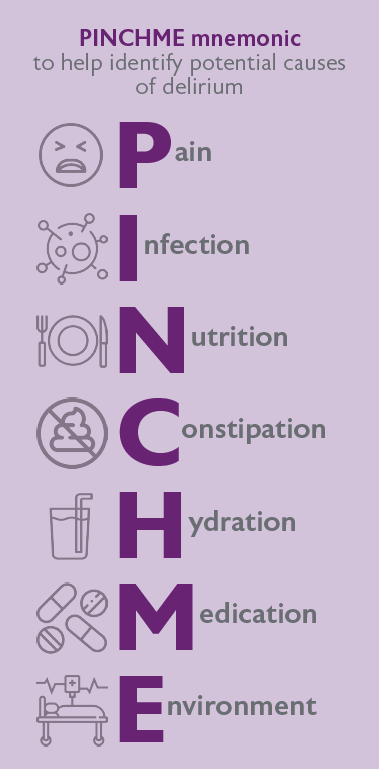Delirium – ‘acute confusion’ - is important to consider at the end of life. It may be almost universal in non-sudden death, especially in those with dementia. Delirium has a poor prognosis, regardless of how well it is identified, investigated and treated, especially the hypoactive (drowsy) form. Half of those with delirium on general and geriatric medical wards will die within six months.
It is important to be aware that people with hypoactive delirium often look like they are dying, but may recover. Delirium also causes distress, and mental distress may be a bigger problem than pain for those dying with frailty or dementia. Furthermore, the condition is unfamiliar to the lay public, and is distressing for families.
Defining delirium, diagnosing it accurately and deciding what to do about it is remarkably difficult. Features vary from person to person, but include:
- Abrupt onset or change from baseline (over hours to days), and fluctuating course (good times and bad times), often worse at night.
- Abnormal attention or arousal: this the cardinal feature, and means distractibility, inability to focus, drowsiness or semi-consciousness.
- Impaired cognition, in any cognitive domain, including comprehension, reasoning and orientation.
- Disordered sleep-wake cycle, fragmented sleep.
- Hallucinations (often visual), delusions (often paranoid), misinterpretations or nightmares, exaggerated emotions or moods.
- Motor restlessness, retardation, or alteration between the two.
- Autonomic features (postural hypotension, incontinence).
- Caused by a physical medical condition, injury, operation, drug or drug withdrawal. However, a medical cause cannot be found in up to 20% of clinically convincing cases.
Identifying delirium
There are various screening tools and diagnostic rating scales. The 4AT is the preferred screening test, but cannot be relied on as diagnostic. All frail older people, people with dementia and people who may be dying are at high risk, so screening is of limited use. All healthcare professionals working with older people should be confident at making a clinical diagnosis, which invariably requires discussion with an informant, usually a relative, care home staff and ward nurses.
'PINCH ME' (Pain, Infection, Nutrition, Constipation, Hydration, Medication, Environment) is a mnemonic which is useful for teaching clinical staff to look for obvious causes of delirium (see image).
Causes of delirium
The precipitant of delirium can be minor. Delirium is 10 times more common in those with dementia. It can be brief and transient (resolved in 24 hours), but may persist (30% at a month, 20% at six months) or the person may not recover at all.
Any medical condition can cause delirium, and more than half of cases have multiple potential causes. At the end of life this may be the underlying condition (cancer, hypoxia, infection), surgery, a complication, a drug side-effect (especially higher doses of opiates, anticholinergics such as hyoscine, and polypharmacy), or drug withdrawal (following de-prescribing, or alcohol withdrawal). Pain, constipation and sleep deprivation have a complex relationship to delirium - all cause irritability; may cause delirium; may be caused by a condition that causes delirium; or delirium may be caused by their treatment.
Delirium causes distress due to hallucinations, delusions, exaggerated or labile emotions (anger, anxiety, fear), or incontinence. It inhibits good communication and decision-making, and relationships with families and healthcare staff; and it makes people prone to complications including falls, pressure sores, dehydration and malnutrition. Delirium can make personal and nursing care difficult if it associated with resistance or aggression.
Both geriatric and palliative practice start with the meticulous assessment of problems. This means identifying delirium, and its consequences, examining the mental state (especially for delusions and hallucinations), and systematically seeking the underlying causes. Causes may or may not be remediable, but if they are can be treated. Estimates are difficult, but up to half of delirium at the end of life can be alleviated. Judicious clinical judgement is required, avoiding investigation and treatment burden, taking into account the anticipated proximity of death and chances of recovery.
Person-centred management
A person-centred approach, familiar from dementia care, includes understanding and validating what the person is experiencing, respecting identity and personal preferences, and using communication and relationships to bring comfort, attachment and inclusion.
Distressing symptoms can be treated with drugs via the oral, transdermal or parenteral (subcutaneous) routes. This will include antipsychotic drugs if necessary (although the evidence for effectiveness is weak). These are also effective for anxiety. Benzodiazepines potentially worsen delirium, and should be avoided, but are needed in some situations including alcohol withdrawal, dementia with Lewy bodies or cases of immediate and grave harm where rapid tranquillisation is needed. There is no evidence to support the use of antidepressants. Co-morbidities should be addressed.
Families’ problems and expectations need to be heard. They should be offered a thorough explanation of what delirium is, and support to remain engaged and supportive of their relative, when they may not be getting much communication or appreciation in return. Patients who survive the episode need explanation and debriefing as a proportion remember, and remain frightened by, their experiences.
Staff and families often want more certainty than can be provided in the face of delirium. We have to live with uncertainty by being honest, realistic and flexible. ‘Hope for the best and plan for the worst’ is good advice.
Resources
- SIGN Guideline: Risk reduction and management of delirium
- NICE Guidance: Delirium: prevention, diagnosis and management
- Delirium information for patients and families: Royal College of Psychiatrists


